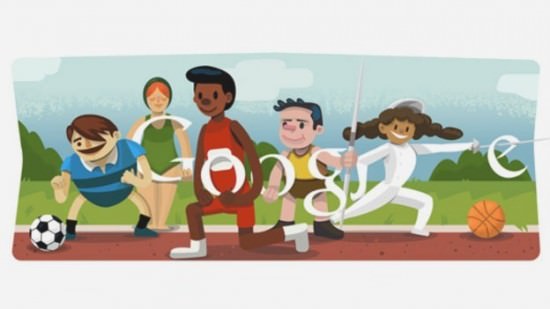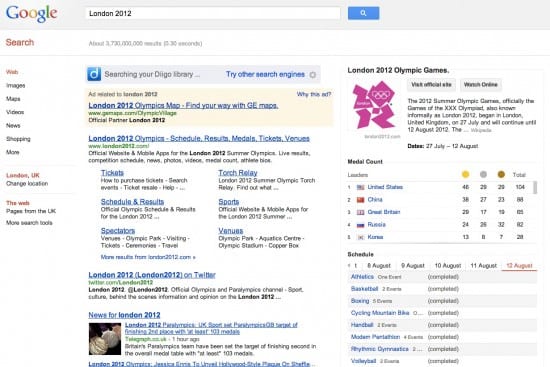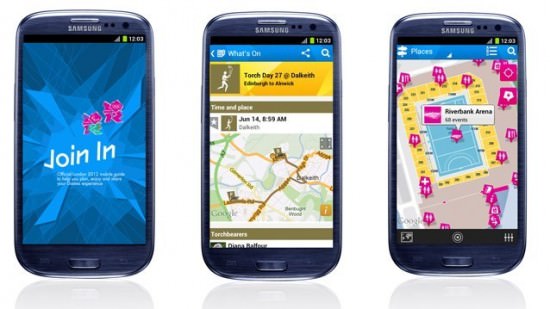The answer depends on your perspective...
We know that the Olympics has been a raving success on so many levels, more so than many of us imagined. So, almost a week after the main event (the Paralympics are still to come), I wondered about the digital success story - what were the take-aways from the London 2012 Olympics for marketers, that we can learn and share on Smart Insights?
I came across this wrap-up from the Head of New Media at London 2012, Alex Balfour. You can see the Slideshare presentation embedded here…
What can digital marketers learn from London 2012?
The data from London 2012 appears impressive in many ways, it's naturally big number information, but I'm struggling to see what the learnings are from a marketing standpoint. With the growth in social media, there were always going to be significantly more digital interactions than previously. After all it was 4 years since the last Olympics in Beijing and it's now 2012 and the Games were in a global hub, London, there's also relentless marketing over the 4 year run-up (done largely for you) - the stage is already set, isn't it? I'd expect Rio 2016 to be the most visited Games site ever, too (that'll be harder in a city that's not necessarily so global).
The 5 other London 2012 web objectives
- Be the ultimate authority on the Games, with unbiased provision of results
- A 'sense of live' that provides greater access to the event wherever the user is
- Appealing to all audiences irrespective of geo-demographics or sporting knowledge
- Encourage to interact and engage with the inspiring stories of the Games
- Generate revenue
Were the goals achieved?
Some observations from the Slideshare…

- REACH: Games-time traffic saw 109m unique users across web and mobile. 60% via search, meaning most traffic came via Google. I really like the tie up with Google (there were 10 Google doodles in 16 days!) - plus leveraging Google's "knowledge panels" was great to see, it gives users data within their search results page based on what they're typing. What can we take from this? Not much in reality, it's hard to mess this stuff up when you're the official site for London 2012 Olympics, SEO was never going to be a tough job in fairness, on top of that Google is going to support the official sites, you're going to be able to get largely what you want from them, doodles included. The breadth of channels used is great to see though, even Google+ was used for the ceremonies, nice

- ACT: In terms of user interactions it's hard to comment, there's minimal data from Alex in regard to anything beyond traffic. The site content is weighted around the run-up to the Games, it's operational and practical, they're the "ultimate authority" on maps, torch relays, Games schedules, athlete profiles, medal tables. Important stuff, but only the basics. All London 2012 web assets appear to have been extremely well engineered, very heavy investment in terms of ensuring open and easy access across lots of devices, catering for people with dyslexia and visual impairment. Very BBC-esque, which is a good thing. In terms of content during the Games though - where was it? Medals tables and news, that's about it really. But of course every media channel had medals tables and news. Where was the content unique to the London 2012 site, the main people behind the Games.

- CONVERT: With a robust web platform, an awful lot of merchandise and spectators dying to buy it, we can only conclude the the conversion to purchase was good for the team. Alex reveals an email database of 4.3 million, we're told that the database was emailed daily, wow. On that note I heard several colleagues annoyed that they were getting hammered with daily sales offers for the Olympic shop (here's an example: "Celebrate the Olympics with free P&P." Ouch).

- ENGAGE: I think this is the main fail area and missed opportunity for the London 2012 team. The "sense of live" is nice across web platforms, but expected, the build your Olympic (SIM) City is kinda cool. Though despite a 4 year run up and rights to the Games, Facebook reach and engagement is awfully low in reality - across multiple Facebook accounts we're told the total is only 1.8m Likes (I accept this is but one metric), yet Facebook is where a huge percentage of the potential audience is already, where's the campaigns to draw people to the main site, or the content to take the Olympic spirit right into Facebook? The reality is that the content is just the basic stuff, so there's not enough for users to Like, share or interact with, unfortunately. The start of something interesting was how London 2012 data was syndicated to athlete's Facebook pages, a step in the right direction. Twitter success was limited too, some great touches using hashtags and syndicating tweets, in terms of the official Twitter presence there were only 1.9m following London 2012.
Did the London 2012 succeed against objectives and its huge potential?
There are two perspectives to this, of course. You'd have to conclude the London 2012 digital team certainly did an excellent job on the basics, you'd guess exactly as briefed. They probably did hit their goals since the goals are very broad, the web platforms were well-built and designed, and I am sure with the high level of awareness and reach, the natural spectator demand and the relentless emailing, a lot of merchandise was sold, too.
In terms of the potential - was it a digital marketing success and did it in fact "Inspire a Generation"? No, it's unfortunately a content and social media marketing belly flop, rather than an Olympic high dive.
What could have been done, what might we learn?
I reflect on this post as a little negative concerning something I wanted to be positive about! So, I'm keen to close on some positive and useful take-aways…
- The key factor is video content: London 2012 team had no video rights to the games, and there's the content success killer. You've two options here I'd have thought - link with the BBC (who nailed it), or create some of your own (behind the scenes, athlete insight, volunteer cams etc), the team did neither. You're only really left with the live results stuff, which in fairness the media channels can (and did) do just as well. The London 2012 site needed to become a publisher for something specific during the Games. We know as digital marketers - awesome content is King, Queen and castle.
- Bring the games to life: Most people didn't attend the Games, were not there. And the stories of the experience of being there make it sound amazing, the TV coverage gave us that sense. We hear the stories of the 70,000 volunteers who inspired the spectators as much as the athletes, imagine what you could have done with these guys - Samsung sponsored camera talking to spectators, streaming the vibe from in and around the stadium, maybe
- Athlete access: the key content surely - of course the Games are strictly controlled when it comes to athletes and image right during the Olympic weeks, yet there are always ways around this. You only have to see the Dre Beats campaign for a lesson in guerrilla marketing
- Mobile Apps: the 15m downloads is really a great success figure, we can only assume usage was good, I used the BBC app since that had video - we're back to content again. The app is one thing, what is does, is another. This is probably the largest missed channel opportunity, given that Alex tells us 60% of traffic came via mobile
- Social interactions: with great content you open the opportunity to interact with people over it. We know several big brands do social engagement and interaction so well, there are some well understood to-do's. Maybe you'd consider mimic-ing Dell's approach and had a small task-force doing one-to-one social outreach and interaction. Seeding the content, starting conversations and getting involved with conversations already happening. I suspect you could get a lot more of the sponsoring brands this way too (BT, Samsung, Omega etc)
What do you think - is there more to take from what was done, am I overly negative, do you have ideas?











